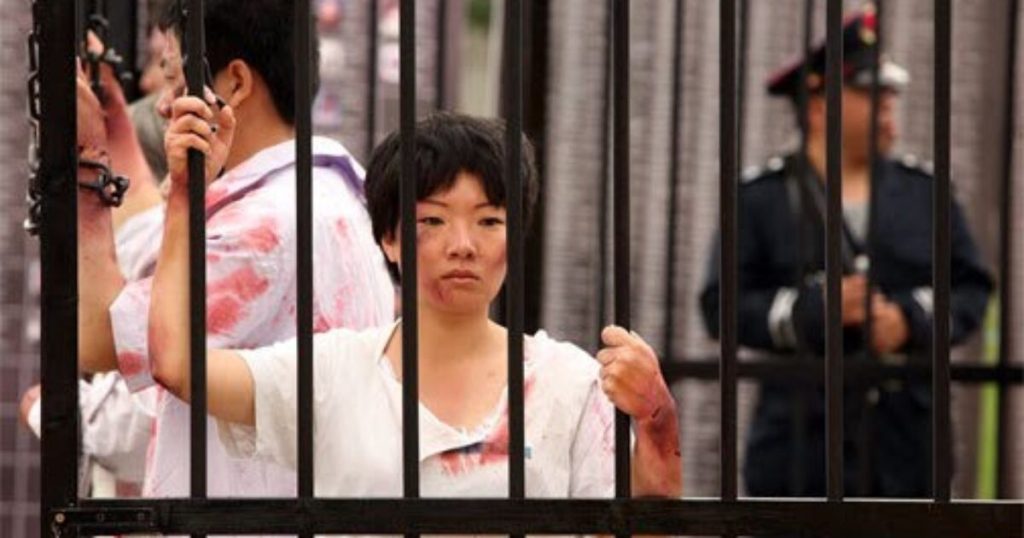

This week, China released three Americans who had been imprisoned for years, and just two months ago, a Christian pastor was freed after enduring 20 years of detention. While the Biden administration took no apparent action to assist these individuals, it is time for Christians to demand accountability from China.
With its oppressive social credit system that can bar individuals from public life, the deliberate erosion of family values, nearly 10 million abortions annually, relentless persecution of Christianity, and suppression of religion, all enforced through a pervasive digital surveillance network, the People’s Republic of China (PRC) resembles a dystopian nightmare straight out of science fiction. China represents a profound moral and spiritual threat. Christians have a duty to boycott Chinese products and urge lawmakers to decouple the United States from this regime.
China poses not only the greatest security threat to the United States but also a profound moral and spiritual challenge, particularly for Christians. As patriots, we should advocate for decoupling from China, cutting off access to U.S. consumer and investor funds. However, Christians have even stronger reasons to boycott China a country where 400 million births were prevented through abortion and sterilization. The Bible warns against aligning with unrighteousness, as stated in 2 Corinthians 6:14: “Be ye not unequally yoked together with unbelievers: for what fellowship hath righteousness with unrighteousness? and what communion hath light with darkness?”
The Chinese Communist Party (CCP) has consistently targeted religious freedoms, persecuting Christians through imprisonment, church demolitions, and censorship of the Bible. Beyond direct persecution, the CCP has eroded traditional family values, promoting policies that encourage children to report religious activities in their homes and using surveillance to divide families. Its infamous one-child policy, which included forced abortions and sterilizations, further exemplifies its disregard for the sanctity of life. Moreover, the CCP’s exploitation of Uyghur forced labor and other vulnerable populations starkly contradicts Biblical teachings on justice and human dignity.
Religious persecution in China is a systematic and far-reaching policy aimed at suppressing all religions that do not align with the Chinese Communist Party (CCP). While the Chinese constitution ostensibly guarantees religious freedom, this is limited to “normal” practices that conform to CCP ideology and are conducted in state-registered places of worship under strict government control. Religious groups that fail to comply face severe repression, including surveillance, forced closures, and imprisonment of adherents. The CCP enforces this control through state-sanctioned “patriotic religious associations,” which govern the five officially recognized religions—Buddhism, Catholicism, Islam, Protestantism, and Taoism—while criminalizing unregistered religious activities.
Christianity faces particularly harsh treatment, with house churches routinely shut down, crosses removed, and congregants monitored. Efforts to “sinicize” Christianity aim to subordinate religious teachings to CCP ideology, including rewriting scripture to align with communist principles. For instance, a government-published textbook altered the Biblical story of Jesus and the adulterous woman, falsely portraying Jesus as stoning the woman to death. Other religions, such as Islam and Falun Gong, have also been targeted. Uyghur Muslims face mass detentions and forced assimilation under the guise of counterterrorism, while Falun Gong practitioners are subjected to deprogramming and imprisonment.
The “sinicization of religion” is central to the CCP’s strategy, embedding political ideology into every aspect of religious life. This policy mandates that religious groups integrate CCP values into teachings, architecture, and governance, ensuring loyalty to the party above spiritual or moral principles. By suppressing religious autonomy and punishing nonconformity, the CCP undermines not only freedom of religion but also the broader cultural and spiritual diversity of China.
The Chinese Communist Party (CCP) has systematically undermined traditional family values, including those rooted in Christianity, through policies and practices that erode family unity and restrict faith-based living. The CCP’s aggressive censorship of Christian content, such as blocking Bible apps and removing online sermons, limits access to spiritual resources and disrupts efforts to nurture faith within families. Platforms like WeChat have banned Christian groups, cutting off digital avenues for evangelism and community building, as reported by organizations like Open Doors USA and China Aid.
Additionally, the CCP’s surveillance culture and social credit system sow distrust within families, directly opposing the Biblical model of unity and mutual support. Children, for instance, are encouraged to report religious activities in their homes, creating an atmosphere of fear and betrayal. These policies pit family members against each other, undermining the sanctity and cohesion of the family unit. By controlling access to faith and fostering division, the CCP erodes foundational values central to Christian teachings on family and community.
During China’s one-child policy (1979–2015), the government actively promoted and, in many cases, enforced abortions as part of its population control measures. Introduced to curb population growth, the policy subjected women to coercive tactics, including threats, fines, job loss, and even physical force, to prevent unauthorized births. Official government data indicates that more than 400 million births were prevented during this era, with approximately 13 million abortions performed annually, with an estimated 336 million abortions during a period of 40 years. While not all were forced, countless women endured extreme measures, including forced late-term abortions, as local officials sought to meet stringent birth quotas. High-profile cases like that of Feng Jianmei, who was forced to undergo a seven-month abortion in 2012, brought global attention to the brutality of these practices.
Beyond abortions, the policy also mandated 200 million sterilizations, further underscoring its invasive nature. Women faced threats of detainment or physical violence if they resisted, and their families were often targeted with financial or social punishments. These actions left profound societal scars, contributing to a significant gender imbalance due to selective sex abortions that favored male children.
Although the one-child policy officially ended in 2015, the damage remains visible. Efforts to relax the rules, first with a two-child policy in 2016 and later a three-child policy in 2021, highlight the long-term demographic consequences of such coercive measures. The family unit has been so degraded by the Chinese Communist Party (CCP) that married couples do not want more than one or at maximum two children and abortions are still one of the most common medical procedures 9.8 million per year.
The post Why Christians Should Boycott the Chinese Communist Party (CCP) appeared first on The Gateway Pundit.







